#Sami Schalk
Text
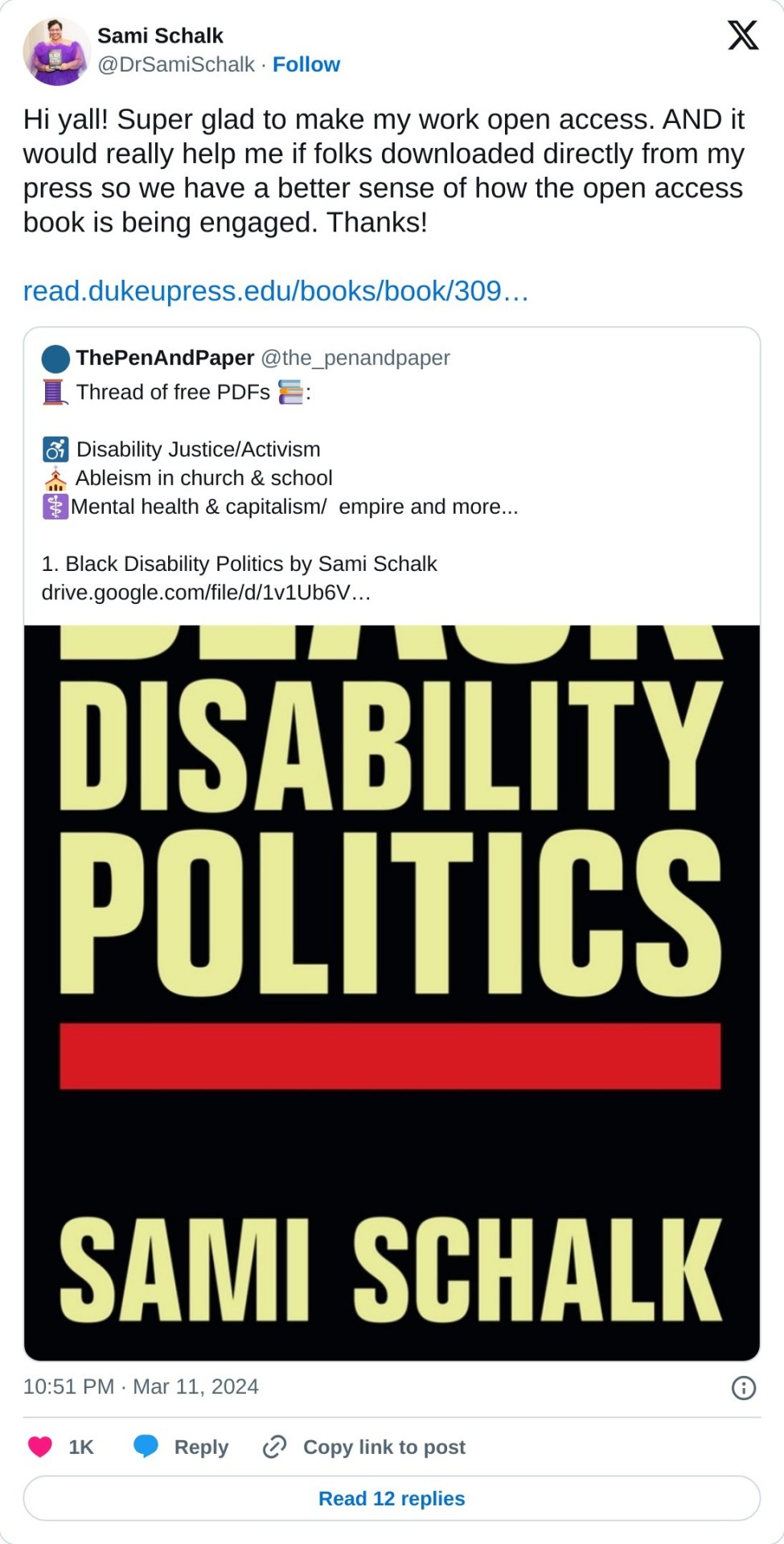
3 notes
·
View notes
Text
How come 'outside agitators' ...
always head for the college campus?
Dear mother, raised as an abstemious Methodist in southeastern Iowa in the 1930s and never trustful of her children’s Catholic nuns, blamed the campus unrest on the tear-gassed state university campus in Madison during the 1960s on “New York Jews.” Sixty years later, supposedly enlightened progressives are the ones blaming — and in some cases persecuting —…
View On WordPress
0 notes
Link
In Black Disability Politics Sami Schalk explores how issues of disability have been and continue to be central to Black activism from the 1970s to the present. Schalk shows how Black people have long engaged with disability as a political issue deeply tied to race and racism. She points out that this work has not been recognized as part of the legacy of disability justice and liberation because Black disability politics differ in language and approach from the mainstream white-dominant disability rights movement. Drawing on the archives of the Black Panther Party and the National Black Women’s Health Project alongside interviews with contemporary Black disabled cultural workers, Schalk identifies common qualities of Black disability politics, including the need to ground public health initiatives in the experience and expertise of marginalized disabled people so that they can work in antiracist, feminist, and anti-ableist ways. Prioritizing an understanding of disability within the context of white supremacy, Schalk demonstrates that the work of Black disability politics not only exists but is essential to the future of Black liberation movements.
#Sami Schalk#Disability#Disability Studies#Black Studies#Black Liberation#The Black Panther Party#the National Black Women’s Health Project
1 note
·
View note
Text
Crip Time
What would a calendar look like that prioritized and protected caregiving? What about one that understood crip time, or different types of relationships and the soft but consistent focus they demand? That understood creativity, and children, or grief?
From a book review in Disability Studies Quarterly (DSQ) — the first academic journal of its kind — Sami Schalk discusses Alison Kafer‘s book, Feminist, Queer, Crip.
Crip time is flex time not just expanded but exploded; it requires re-imagining our notions of what can and should happen in time, or recognizing how expectations of ‘how long things take’ are based on very particular minds and…
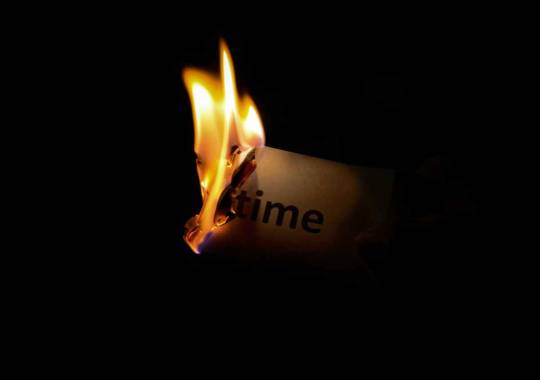
View On WordPress
0 notes
Text

Police at UW Madison have just arrested notable Black disability justice writer & professor Dr. Sami Schalk, who was sitting peacefully with students and colleagues on campus.
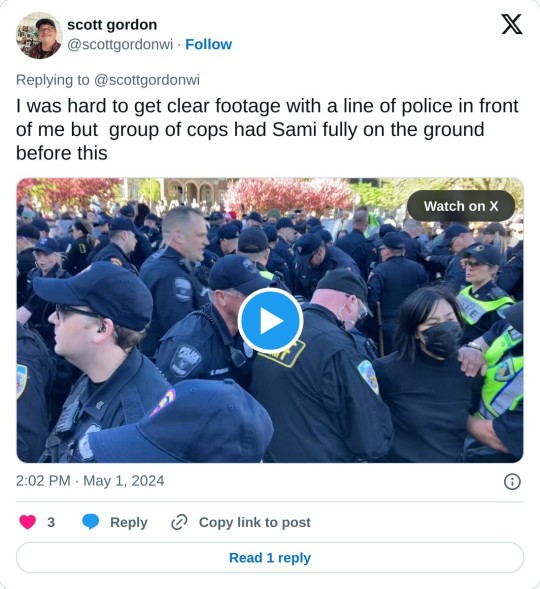
This after they injured and arrested Professor Samer Alatout, who was targeted for being a person of color.

Keep on top of these developments by following actual local reporters, like my friend Scott Gordon at Tone Madison.
UPDATE: As of 10 am Central, Sami has been released and is currently at the hospital for a once-over.
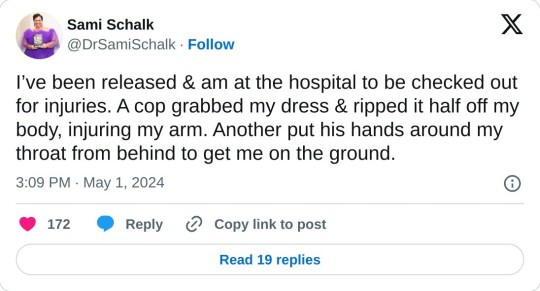
I want to note that Sami is pretty well known in Madison, not just for her work but for twerking onstage with Lizzo and Janelle Monáe.
I would not be surprised if they knew exactly who they were harming.
UPDATE 2: As of 1:30 pm Central, Sami is back at her home with a sprained shoulder, bruises, and significant pain.
Note: in the video in the following tweet, Sami is being strangled by a police officer.
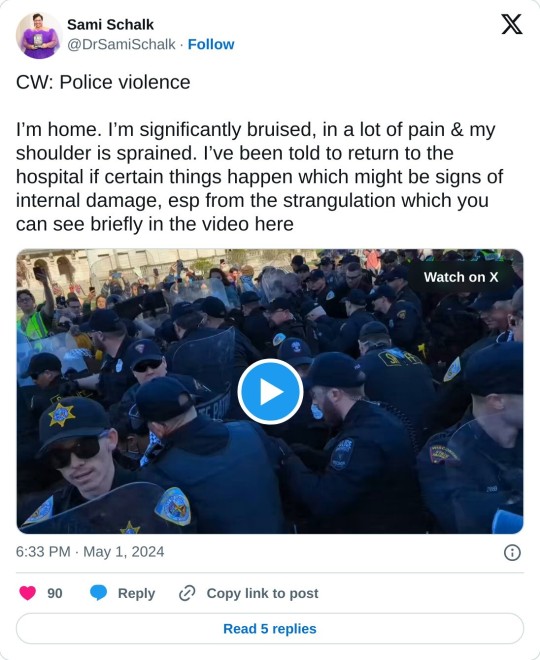

UPDATE 3: Sami has posted photos of her injuries on Instagram:
instagram
#you can't take the Madison out of the kid i guess#disability justice#dr. sami schalk#palestine#free palestine#uw madison#Instagram
480 notes
·
View notes
Text
I've got some random resources that I want to share but never really had a place to put them, so I'm putting them all here! These are all things that I have come across/been sent and tested myself:
LGBTQ Reads: Disability and Neurodivergence Booklist: Sent to me by @qbdatabase (tagging so you can find their blog). I'm working on transferring it to my archive. This list is very extensive but definitely worth a look.
Black Disability Politics, Open Access: Follow this link to find the open access version of Sami Schalk's book "Black Disability Politics"
Trigger Warning Database: Big list of trigger warnings for different books. Incredibly useful. There's a search function, a masterlist, and a place to submit your own.
The Disabled People's Archive: An archive for disability history!
Book Trigger Warning: Like the Trigger Warning Database. A searchable wiki of book trigger warnings.
Viklangta and WeCapable: At first I thought this was just a site for disability journalism, but that's not all. It's run by Samyak Lalit, the founder of the Evara Foundation, which champions the "empowerment of persons with disabilities". The first link takes you to the Hindi site, and the second takes you to the English site.
Disability & Mental Health Resources for Gamers: Exactly as its title says. This is a masterpost that links to resources regarding disability, mental health and gaming!
Becoming An Adult Cheat Sheet!: Big masterpost (with links) to teach you about and help manage adult life.
In Case Anyone is Having a Bad Night: Massive list of links to help with self care and relaxation. Some of the links don't work, unfortunately, but my god is it wonderful.
#will be adding more when I find them#but for now enjoy!#resources#disability resources#book resources#self care resources#self care#disability#links#to be updated
84 notes
·
View notes
Note
would love to hear about your books and poems recs about disabilities!!!
<3 !!
books i really liked & highly recommend:
- being heumann (judy heumann)
- disfigured (amanda leduc)
- disability visibility (alice wong)
- the cancer journals (audre lorde)
- klara and the sun (kazuo ishiguro)*
- how to keep house while drowning (kc davis)**
—
*fiction, but i think it deals really well with the subject of chronic/terminal illness; it really struck a chord with me
**not necessarily about disability but it’s got a lot of tips for being gentle & working kindly & effectively with your neurodivergent self & it’s genuinely one of the best nonfiction books i’ve ever read
—————
books i haven’t read but want to:
- capitalism and disability (keith rosenthal)
- black disability politics (sami schalk)
- show me where it hurts (kylie maslen)
- brilliant imperfection (eli clare)
- allies and obstacles (pamela block)
- the tiger and the cage (emma bolden)
- the care we dream of (zena sharman)
—————
my favorite poems about disability:
- ode to the chronically ill body (camisha jones)
- cachexia (max ritvo)
- the cancer diagnosis & chronic illness (fortesa latifi)
- upon receiving my inheritance (william fargason)
- ode to plastic cups (naomi oritz)
- i’m rewatching the she-ra episode where glimmer gets sick for the first time (arianna monet)
- advice to the able-bodied poet entering the disability poetics workshop (liv mammone)
—————
a few miscellaneous things:
- my spirit burns through this body (an essay by akwaeke emezi)
- things that able me (an essay by christy tending)
- grappling with cure (a recording of a speech by eli clare)
(ps, if anyone has any recommendations or thoughts on any of these, please share!! i’d love to hear)
#unfortunately the books i listed as want to read arent ones i have access to & i can’t afford to buy them due to Not Able To Work </3#but thank u for this ask!! im bedbound rn and it was a good distraction :’) <3#asks#disability#disabled#chronic fatigue#chronic pain
11 notes
·
View notes
Text
"Make no mistake: There is an ideological witch hunt happening on college campuses right now, the likes of which has not been seen since Senator Joseph McCarthy and the House Un- American Activities Committee tried to ruin people’s reputations in the middle of the last century. Students and professors are being targeted by university administrators, assaulted by police, and investigated for their politics by Congress.
And yet, it is only the second worst thing happening to college students and professors right now. ...
in their book Manufacturing Consent: The Political Economy of Mass Media, Noam Chomsky and Edward Herman described the kinds of things which have been happening to professors like me as the fourth filter of their “propaganda model,” where flak or enforcers beat people up in the town square (verbally, politically, or even physically). The point of these spectacular floggings? When academics or journalists are seen being punished publicly, others are meant to get the message that they should keep quiet—or else.
One of the most violent forms of university flak has been the withholding of degrees, when students have worked towards diplomas for many years and have them stolen for engaging in moral disobedience about genocide. As postcolonial scholar Priyamvada Gopal observed, when university trustees have done this, it is “immoral blackmail, as is overruling faculty on this matter.”
Jairo Fúnez-Flores, an Assistant Professor of Curriculum Studies and Teacher Education in the Department of Curriculum and Instruction at Texas Tech University, was suspended for 40 days for his outspoken Palestinian support before being reinstated. Sami Schalk, author of the book Black Disability Politics, was hospitalized after being brutally attacked by police at the University of Wisconsin-Madison while trying to protect her students. Cops even broke a hand and nine ribs of Southern University of Illinois Edwardsville professor Steve Tamari while he was peacefully protesting at Washington University in St. Louis, Missouri. And Mohamed Abdou, a visiting professor at Columbia University, was inhumanely alerted he was being fired when president Minouche Shafik threw him under the bus on live TV during a congressional hearing; he received no due process and is being forced to leave the United States.
And still, as horrible as this has been for all of us in America, what we are encountering is not the worst thing happening to professors right now.
Far from it. Our Palestinian colleagues have been experiencing far worse.
At least 95 university professors have been killed in Gaza since the genocide began, according to the United Nations.
The UN reports that “more than 80 percent of schools in Gaza” have been “damaged or destroyed,” while the ICJ bluntly says that “Israel has targeted everyone one of Gaza’s universities, “including the Islamic University of Gaza, the oldest higher education institution in the territory, which has trained generations of doctors and engineers, amongst others—destroying campuses for education of future generations of Palestinians in Gaza.”
The UN uses a single, powerful word to describe what is happening to educators and education institutions in Palestine: scholasticide, the willful destruction of a society’s ability to produce knowledge and educate its people. Preventing a population from being able to do research and to teach its citizens literacy, agriculture, medicine, science and culture is an aspect of genocide is to take away the very means of life.
#McCarthyism#scholasticide#palestine#free palestine#gaza#isreal#genocide#colonization#apartheid#american imperialism#us politics#police state#solidarity encampments#gaza solidarity encampment#solidarity#settler police#settler colonialism#settler violence
9 notes
·
View notes
Text
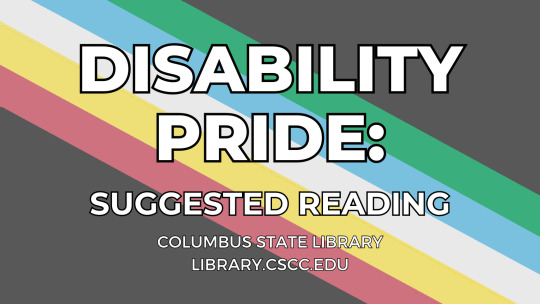
[Image description: Horizontal rectangular graphic; the background is the Disability Pride flag, with adjoining red, yellow, white, aqua, and green stripes slanting together from the top left to bottom right corners on a dark gray background. White text in the center foreground says "Disability Pride: / Suggested Reading / Columbus State Library / library.cscc.edu."]
July is Disability Pride month, and that means it's time for a bigger, better, updated Disability Pride reading list!
A Disability History of the United States, by Kim E. Nielsen
Being Heumann: An Unrepentant Memoir of a Disability Rights Activist, by Judith Heumann
About Us: Essays from the Disability Series of the New York Times, Peter Catapano and Rosemarie Garland-Thomson, editors
Care Work: Dreaming Disability Justice, by Leah Lakshmi Piepzna-Samarasinha
Demystifying Disability: What to Know, What to Say, and how to Be an Ally, by Emily Ladau
Disability as Diversity: Developing Cultural Competence, by Erin E. Andrews. Companion case study volume here.
Exile & Pride: Disability, Queerness, and Liberation, by Eli Clare
The Minority Body: A Theory of Disability, by Elizabeth Barnes
Nothing about Us without Us: Disability Oppression and Empowerment, by James I. Charlton
The Problem Body: Projecting Disability in Film, Sally Chivers and Nicole Markotić, editors
Routledge Handbook of Disability Studies, Nick Watson and Simo Vehmas, editors
My Wonderful Life as a Vegetable, Lars Feldballe producer/director
The Disability Rights Movement: From Charity to Confrontation, by Doris Zames Fleischer and Frieda Zames
Disability Experiences: Memoirs, Autobiographies, and Other Personal Narratives, G. Thomas Couser and Susannah B. Mintz, editors
The Routledge Handbook of Disability Activism, Maria Berghs, Tsitsi Chataika, Yahya El-Lahib and Andrew K. Dube, editors
Black Disability Politics, Sami Schalk
Year of the Tiger: An Activist's Life, by Alice Wong
Disability Visibility: First-Person Stories from the Twenty-First Century, Alice Wong, editor
From the Periphery: Real-Life Stories of Disability, by Pia Justesen
Young, Disabled and LGBT+: Voices, Identities and Intersections, Alex Toft and Anita Franklin, editors
Disability, Media, and Representations: Other Bodies, Jacob Johanssen and Diana Garrisi, editors
The Routledge Handbook of Disability Arts, Culture, and Media, Bree Hadley and Donna McDonald, editors
Occupying Disability: Critical Approaches to Community, Justice, and Decolonizing Disability, Pamela Block, Devva Kasnitz, Akemi Nishida, Nick Pollard, editors
Use our catalog to search for more titles on this topic!
Current Columbus State Students and employees can check out books using a photo ID. Ebooks and other electronic materials can be used both on and off campus; off-campus use requires logging in with your Columbus State username and password.
35 notes
·
View notes
Link
"Black disability politics is the way that Black people engage with disability as a political and social issue, rather than a simply a medical or personal issue." https://19thnews.org/2023/02/black-disability-politics-book-sami-schalk/
40 notes
·
View notes
Text
For instance, scholars and activists today, building on existing work in disability studies, can use and adapt the approaches of the [Black Panther Party] when identifying, raising awareness about, critiquing, and fighting various forms of disabling violence in our world without making disability the symbolic specter of injustice. That is, rather than using the image of disability to represent the wrongness of social ills, such as environmental destruction, medical discrimination, or war, thereby relying on ableist emotional responses to disability, we must instead take a different approach that balances the lived realities of disabled people with attention to how the intersections of larger social systems of oppression produce additional disablement and make living with a disability increasingly difficult. This change in activist argumentative, representational, and rhetorical approaches includes three tactics I've articulated by building on the work of Kafer and Clare. First, focus on violence as the issue/problem to be solved, not disability. Second, emphasize the interconnected narure of social justice concerns. Third, incorporate material support for people disabled by the violence of injustice and oppression.
These alternative tactics for fighting disabling violence apply beyond Black activism alone but are especially important for antiracist work since so much racial violence, from police brutality to racism within medical care to environmental hazards situated in poor and nonwhite neighborhoods, debilitates and disables people of color.
Sami Schalk, Black Disability Politics
3 notes
·
View notes
Text
oh yeah anyways i got a book the other day im very excited to read, its called black disability politics by sami schalk if anyone is familiar with it, im curious to hear
5 notes
·
View notes
Text
Thotty's Spring-Summer TBR
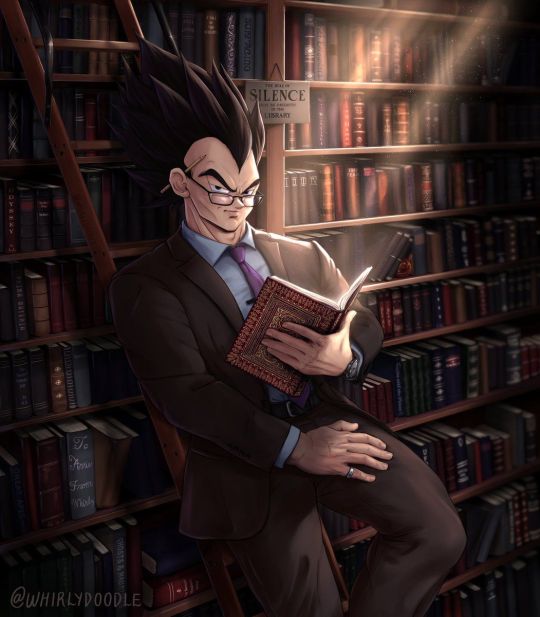
To be started
Excluded: Making Feminist and Queer Movements More Inclusive by Julia Serano
Darkly: Black History and America's Gothic Soul by Leila Taylor
Toward the African Revolution by Fanon
Black Disability Politics by Samantha Dawn Schalk and Sami Schalk
Notre Histoire: The First Hundred Years of Haitian Independence by Ghislain Gouraige Jr.
Sexed Up by Julia Serano
The Color of Kink: Black Women, BDSM, and Pornography by Ariane Cruz
Flowers for the Sea by Zin E. Rocklyn
Against the Loveless World by Susan Abulhawa
Miss Major Speaks: The Life and Legacy of a Black Trans Revolutionary by Toshio Meronek
Revolution is Love: A Year of Black Trans Liberation by Qween Jean and Joela Rivera
Sisters in the Life: A History of Out African American Lesbian Media-Making Editor(s): Yvonne Welbon and Alexandra Juhasz
Keith Haring's Line Race and the Performance of Desire by Ricardo Montez
Queer Latino Testimonio, Keith Haring, and Juanito Xtravaganza: Hard Tails by A. Cruz-Malavé
To Be Finished
When Chickenheads Come Home to Roost by Joan Morgan
Whipping Girl by Julia Serano
Black Trans Feminism by Marquis Bey
Reel to Real: Race, class, and sex at the movies by Bell Hooks
Culture and Imperialism by Edward Said
Re-reads
Black Marxism by Cedric Robinson
Anarcho-Blackness Notes Toward a Black Anarchism by Marquis Bey
Anarchism and Black Revolution by Lorenzo Kom'boa Ervin
Pedagogy of the Oppressed by Paulo Freire
Cistem Failure by Marquis Bey
Every Tongue Got to Confess: Negro Folk-tales from the Gulf States by Zora Neale Hurston
The Book of Negro Folklore Editor(s) Langston Hughes & Arna Bontemps
Reccs
An Unkindness of Ghosts by Rivers Solomon
The Deep by Rivers Solomon
Black on Both Sides: A Racial History of Trans Identity by C. Riley Snorton
Some Wear Leather, Some Wear Lace: The Worldwide Compendium of Postpunk and Goth in the 1980s by Marloes Bontje
The Blood of A Thousand Roots by Dane Figueroa Edidi
My Soul to Keep by Tananarive Due
My Sister, the Serial Killer by Oyinkan Braithwaite
Street Style by Ted Polhemu
Belly of the Beast: The Politics of Anti-Fatness as Anti-Blacknes By Da’Shaun L. Harrison
The Death of Vivek Oji by Akwaeke Emezi
Insights: Film & Television by TRUDY
Shuckin' and Jivin': Folklore from Contemporary Black Americans by Daryl Cumber Dance
#thotty speaks#Thotty's Library#Reading with Thotty#We making out the depression spiral with this one!!!!!!!! (maybe)
6 notes
·
View notes
Text
man I'm finally getting around to reading Pleasure Activism because Sami Schalk talked about it in Black Disability Politics but like. man. it's very hard to fuck with adrienne maree brown unironically shilling for reiki. ma'am please be serious.
8 notes
·
View notes
Note
does speculative fiction count as fantasy for the purposes of this blog?
you’re going to have to be more specific — everybody uses the term to mean something different. some common meanings:
its original sense ca. the 1960s was as an alternative, more prestigious genre label for (especially New Wave) science fiction: Thomas M. Disch’s 334 is “speculative fiction” in this sense, but it’s definitely not fantasy. Heinlein, to whom this usage is attributed, apparently explicitly excluded fantasy from it. I assume this isn’t the sense you mean, but it’s still out there (in andré m. carrington’s Speculative Blackness, for example), so I wanted to flag it.
a more recent development — and my own most common use (following Sami Schalk in Bodyminds Reimagined) — is the use of “speculative fiction” as an umbrella term encompassing both science fiction and fantasy. in this usage, Octavia E. Butler’s Dawn (sci-fi) and N.K. Jemisin’s The Hundred Thousand Kingdoms (fantasy) are both “speculative fiction”, but Dawn would not count as fantasy for the purposes of this blog.
secondarily, it’s sometimes used to mean texts that seem to have something either science-fictional or fantastic going on, but in a way that’s difficult to pin down specifically (also encompassing the European “fantastic”, which I personally generally dislike but which is at least sometimes close enough to fantasy that I’ll accept it). if this is the sense you mean, it would depend on the individual text but I’m probably open to it — I queued Haïlji’s The Republic of Užupis and Jan Morris’s Last Letters from Hav, for example, and would likewise accept Renee Gladman’s Ravicka books.
if you’re not sure where something would fall, you’re welcome to submit it with an explanation and I’ll either accept it or explain my reasoning for excluding it.
does that help?
2 notes
·
View notes
Note
1 & 2 for the reading asks? 📚
What are 2-5 already published fiction books you think you want to read in 2023?
Here are 5 more from my gotta-read list!: Dora M. Raymaker, Hoshi and the Red City Circuit, Lydia Yuknavitch, The Book of Joan, Seth Dickinson, The Traitor Baru Cormorant, Lucy Corin, One Hundred Apocalypses and Other Apocalypses, Fannie Flagg, Fried Green Tomatoes at the Whistle Stop Cafe.
What are 2-5 already published nonfiction books you think you want to read in 2023?
Annnnnnd 5 more NF: Sami Schalk, Black Disability Politics, Walter Benjamin, The Arcades Project, Beatrice Adler-Bolton and Artie Vierkant, Health Communism, Alison Jane, Meander, Spiral, Explode, Tillie Walden, Spinning.
12 notes
·
View notes